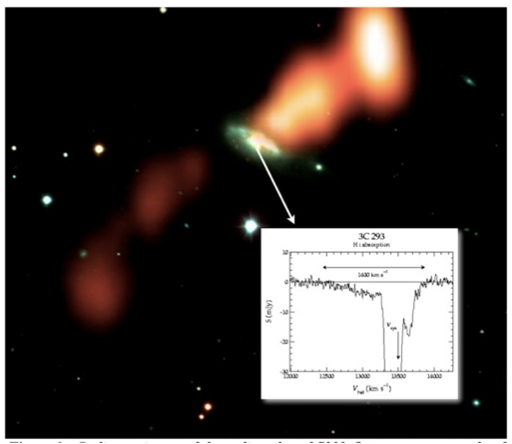ERC Advanced Grant for astronomer Raffaella Morganti

The European Research Council (ERC) has awarded an Advanced Grant to Prof. Raffaella Morganti, head of the Astronomy Group at ASTRON and professor by special appointment on Structure and Evolution of Radio Galaxies at the Kapteyn Astronomical Institute of the University of Groningen. Prof. Morganti will receive approximately 2.5 million euro for her research project ‘Exploiting new radio telescopes to understand the role of AGN in galaxy evolution'. This grant will permit her to employ PhD students, post-docs and a software engineer over a period of 5 years.
Prof. Morganti's project is aimed at understanding what fraction of the time the central massive black hole of a galaxy is active at radio frequencies and what the impact of this phase is on the evolution of the host galaxy. The possibility of making a major breakthrough in this field comes from two new and revolutionary radio telescopes of ASTRON: LOFAR (the Low-Frequency Array) and the focal-plane array system Apertif, which is to be installed on the Westerbork Synthesis Radio Telescope (WSRT).
The ERC Advanced Grants are only awarded to exceptional scientists. The grant to prof. Morganti is the fifth ERC Advanced Grant that is awarded to a project related to the LOFAR telescope and/ or to Apertif. This is a clear demonstration of the excitement that exists in the astronomical community about the scientific potential of these instruments, and about the people involved with them.
| Last modified: | 03 September 2021 2.56 p.m. |
More news
-
13 May 2024
‘The colourful cells of petals never get boring!’
Most people will enjoy colours in nature. However, the interest of evolutionary biologist Casper van der Kooi goes much further: he studies how flowers, birds, butterflies, and beetles get their colours. He also studies how these colours are used...
-
13 May 2024
Trapping molecules
In his laboratory, physicist Steven Hoekstra is building an experimental set-up made of two parts: one that produces barium fluoride molecules, and a second part that traps the molecules and brings them to an almost complete standstill so they can...
-
07 May 2024
Lecture with soon to be Honorary Doctor Gerrit Hiemstra on May 24
In celebration of his honorary doctorate, FSE has invited Hiemstra to give a lecture entitled ‘Science, let's talk about it’ on the morning of 24 May
